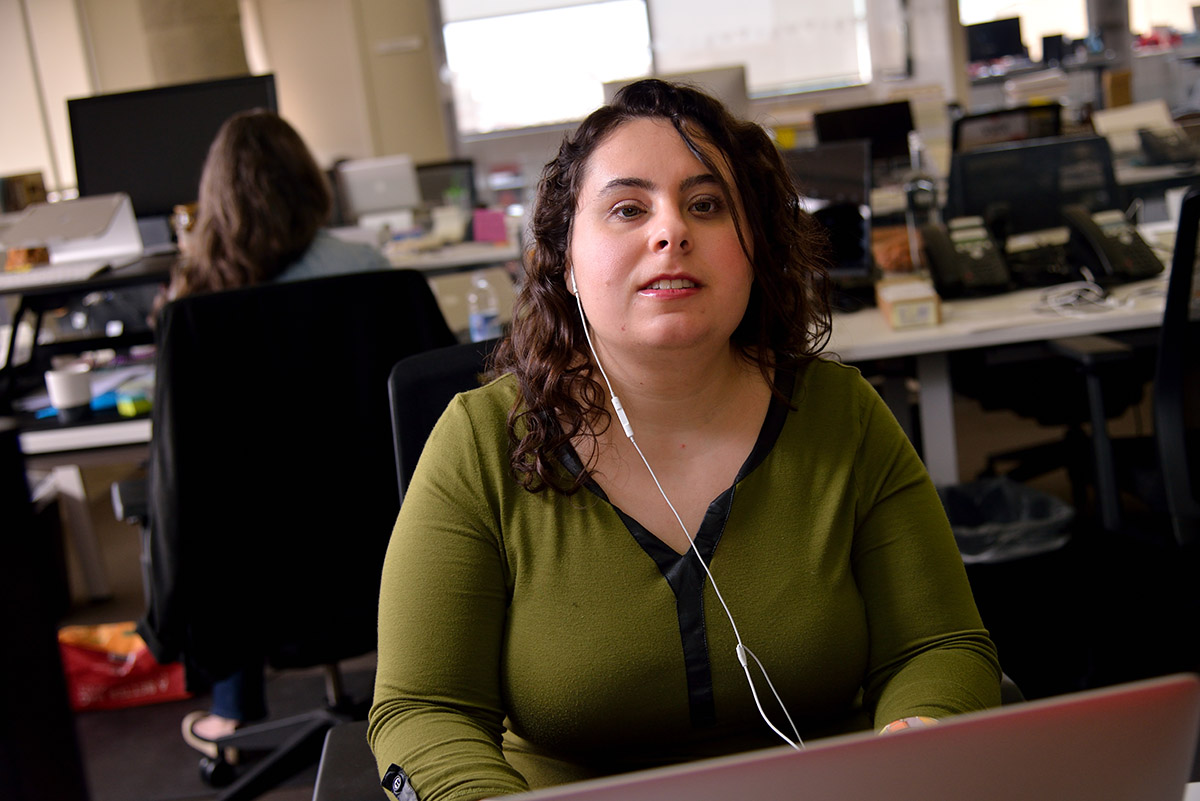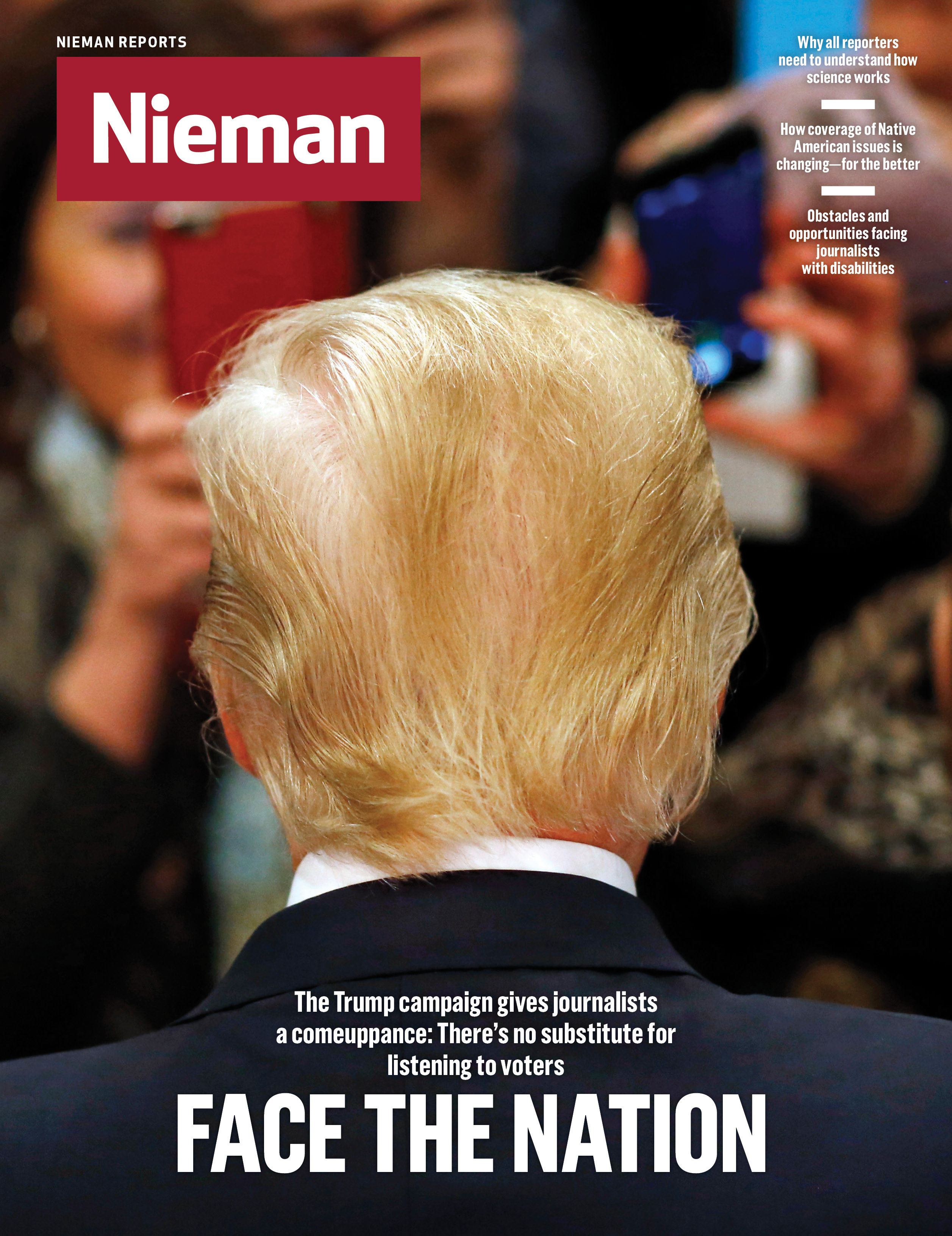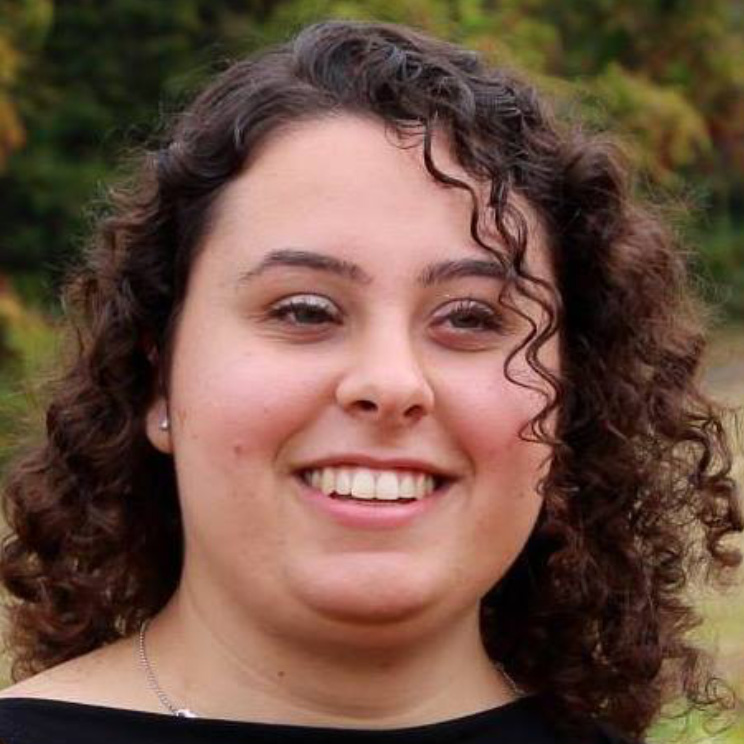
Despite latent prejudice early in her career, Michelle Hackman now covers politics for Vox
The event was held on a grassy agricultural research campus several acres wide, a devilish labyrinth to navigate on deadline.
I showed up 20 minutes early and started wandering aimlessly in search of the press conference. Just when I was ready to declare defeat on this most unimportant of assignments—the phone was already in my hand, ready to dial my editor—I heard a gaggle of chattering figures ahead. Reporters! I jogged right at them.
“Excuse me!” I practically shouted at one of the men. “Do you know where the press conference with Richard Blumenthal is happening?” We collided as he turned to look at me.
“Yes,” he said. “It’s right here. I’m Senator Blumenthal.”
The senator was very gracious about our chance encounter. He asked me which media outlet I was with and even personally helped me set up my mic on the podium. Doubtless, within several minutes, he—and everyone around us—had forgotten the whole debacle. But I couldn’t rid myself of it.
As a kid, I’d always dreamed of this day: when I, as a professional reporter, would be sent chasing after politicians to reveal some as-yet unspecified injustice. (Doubtless my childhood reveries centered far from the grassy, humid places of that day’s press conferences, let alone from the treatment of Lyme disease.) Before the Blumenthal run-in, I’d honestly never pondered just how I would pull it off in real life.
Ten years earlier, the little vision I’d grown up with, the kind of vision where I’d have to hold a book inches away from my face to make out the letters on the page, one-by-one, washed away. Officially, the doctors said my retina had detached, and no amount of surgery could re-glue it in place. But to my young mind, a world that had once taken on fuzzy outlines simply grew hazier. I was totally blind, yes, with not so much as the ability to detect faint traces of light. But I’ve always found the metaphor of darkness inadequate. I didn’t see darkness so much as I projected, through my other senses, the outlines of spaces I was moving through—the wide boxiness of a classroom with its sound-muffling carpeting; the echoes of a skinny hallway stretching far ahead.
It was perhaps because of the sudden onset of blindness, not in spite of it, that I first fantasized about journalism. Because I needed others’ hands to guide me across a street or to the bathroom, I wanted nothing more than an adulthood of everything I couldn’t have then: independence, adventure, respect.
So, I did what seemed instinctual. I became a journalist, writing first for my high school monthly and then the college paper. Naturally—this was my escape route, after all—I never dwelt on disability in my writing. I was lucky in this regard: politics compelled me as much as disability repelled me, and my wonky niche distracted editors from the fact that I could instead be writing compelling disability narratives.
I refused to think of myself as a “blind journalist” or a “disabled journalist.” Though I knew of exactly zero blind people who’d become successful roving reporters before me, I’d already concluded that the path for me was not only possible but inevitable. Before I’d really gotten into the nitty-gritty of the profession, I would have never thought to write this article. I would have believed it unnecessary and perhaps even unseemly if tied to my name.
There’s an unexpected bright side to being a journalist with a disability: Holding a cane can be disarming, helping you connect with a source in an unguarded moment
Today, thanks to the Americans with Disabilities Act (ADA), journalists with disabilities find the path to employment better paved than ever before. But that doesn’t mean disabled journalists find themselves by any means on equal footing with their non-disabled counterparts. Those who make it in the field are the standout go-getters who seek out work-arounds to lessen the burden of their disabilities on employers. They are the few willing to pour extra effort into their stories in the hope that audiences will view their reporting as equal to that of non-disabled journalists. And they are the ones willing to tolerate relentless, if latent, prejudice from sources and editors alike who often have trouble squaring disability with competence.Half a decade before the ADA’s passage, a forward-thinking newsroom hired a young blind college grad named Elizabeth Campbell, now a veteran reporter for the Fort Worth Star-Telegram. While she never faced outright discrimination, she did need to coax editors into accommodating some of her unique needs. They were unwilling to hire Campbell a driver, for example, until she pointed out that the paper reimbursed other reporters by the mile when covering stories.
Lisa Goldstein, a deaf freelance journalist living in Pittsburgh, uses e-mail or chat programs to conduct the vast majority of her interviews, avoiding the inaccuracies of lip reading or the captioning on her telephone. “It’s great for accuracy,” she told me over Facebook Messenger.
Reid Davenport, a documentary filmmaker in California who has cerebral palsy and uses a wheelchair, employs a 96-button keyboard, called IntelliKeys, that functions as both a keyboard and a mouse. Despite editors’ suspicions to the contrary, Davenport told me, the only small adaptation he requires for a work computer is software that allows him to connect the computer to his keyboard.
Like Campbell, Goldstein, and Davenport, I have found that it’s helpful during job interviews to casually explain how I might handle a story, volunteering details about my computer (I can install screen-reading software on almost any computer, which will read aloud what I read and write) or my travel habits (I rely heavily on Uber for spot news and interviews; cheaper than a cab and easier for me to hail). Every editor I’ve worked for has asked how I include such vivid visual details in my stories, from descriptions of rich carpeting to the details of a character’s facial expression. The answer is simple: I ask, and then record the details in quick voice notes on my cell phone.
These work-arounds are certainly not easy to come by. “I find that I have to be my own IT person,” Campbell told me. She attends conferences to stay on top of the latest adaptive technology. Harder for journalists like me to stomach are the small daily affronts that come with no easy fix. The moment when an editor assigns a story that’s rightfully yours to another reporter, because he or she thinks the other reporter can more easily carry it out; debating whether to reveal to a source that you have a disability; the pain of having someone do a double-take when you identify yourself as a journalist.
All of these experiences, in one way or another, weave themselves inextricably into the fabric of our work. Campbell knows that when she’s out in the field she might be met with a brief pause of surprise when she introduces herself as a representative from the local paper. Goldstein says she now expects some momentary confusion when she requests to conduct interviews over messenger programs.
Davenport, the journalist who uses a wheelchair, also has impaired speech due to his cerebral palsy. His words come out slowly, slurring together. When he was working as a daily reporter, both for his college paper and as an intern for publications, his speech proved more devastating for his work than his use of a wheelchair. When he left messages requesting calls back, he often wouldn’t get a response. When he did manage to get someone on the phone, they would routinely hang up on him in frustration. “If I had clear speech,” he says, “my life would be totally different.”
After two internships did not lead to full-time employment, Reid changed his strategy. He started producing documentary films, which allow him to develop deeper, longer-term relationships with his sources. That helps work through the initial awkwardness of presenting himself as a journalist.
In the years I’ve been doing journalism, my own streak of embarrassment and shame has shown little sign of slowing. I’ve needed help from security guards (sometimes even guiding me by the hand) to find important offices or meetings. I’ve asked editors for help reading the most basic charts embedded in reports, swallowing any pride I had about independence. And I’ve routinely been subtly passed over to cover breaking or spot news because, as far as I can tell, editors don’t trust me to be as fast as my peers.
With all that said, nearly everyone who spoke to me also brought up the same, unexpected bright side to working as a disabled journalist. So much of the job, they argue, is attempting to capture people at their most unguarded moments—to break through public relations noise or overcome an individual’s fear of speaking with the media. A journalist approaching strangers with their disabilities plainly visible, be it the cane they’re holding or the hearing aid they’re wearing, can be disarming.
Will Butler, another blind journalist, put it best. Sources are “impressed with your abilities, so they want to give you more, and they want to make your job easier,” he says. “Whereas if you are some hotshot reporter who looks like you know what you’re doing, a lot of people’s guard will shoot right up.”
Granted, that advantage is not great enough to push anyone with a disability into journalism, but the frustrations, for a select few people at least, don’t appear to be harsh enough to push disabled individuals out of journalism, either. What we all share is an unadulterated, idealistic love for the profession that comes independent of our disabilities.
Since that encounter with Senator Blumenthal, I have reported on a whole range of more consequential political stories, ones that have sent me on travel and, just as in my dreams, running through the halls of Congress. Those opportunities haven’t come because of my blindness or in spite of it. They are a direct product of my deep interest in political events. I have just tolerated many small slights along the way.


